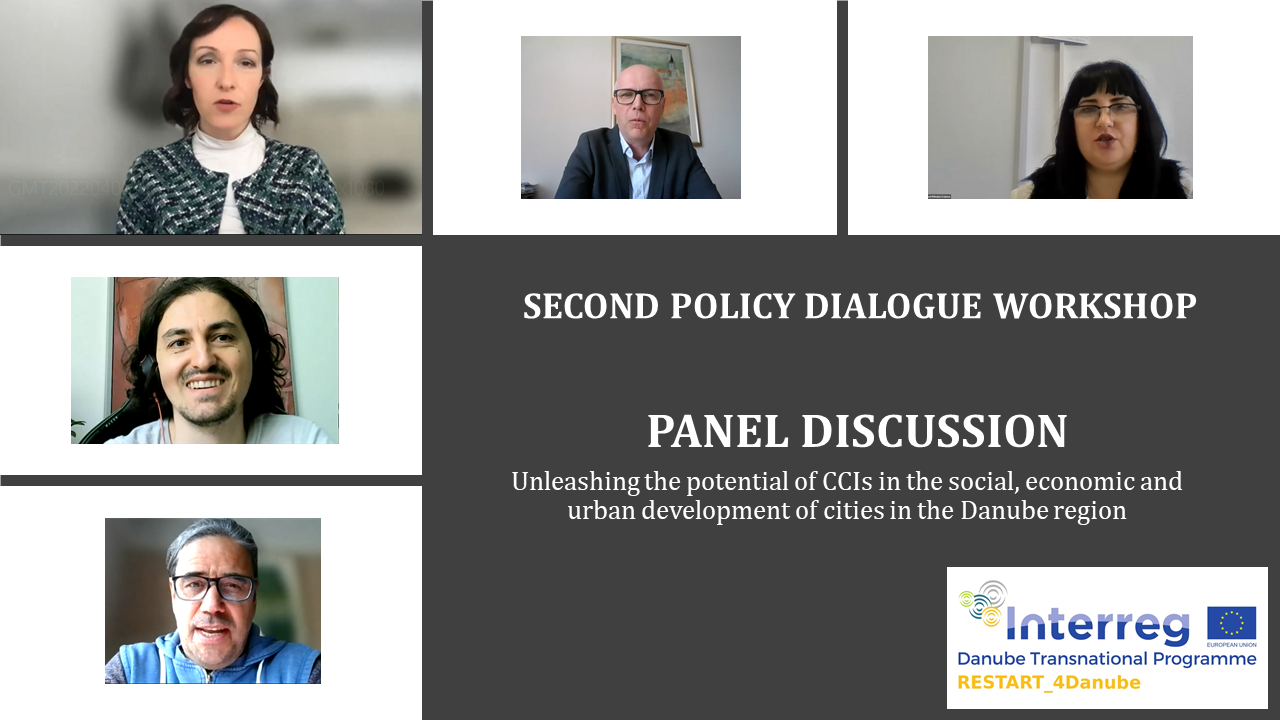RESTART_4Danube - Creative Urban Regeneration in the Danube Region
11-05-2022
Project partner Steinbeis Europa Zentrum organised an international dialogue on strategy development as part of RESTART_4Danube
On April 5, 2022, the consortium invited to a public dialogue workshop with more than 60 participants. The project coordinator Prof. Alexandru Marin from the University POLITEHNICA Bucharest, Romania presented the project goals and activities of RESTART_4Danube. Nika Stanjko from the University of Maribor, Slovenia then presented the five Local Action Plans (LAPs).
The five Local Action Plans - in Craiova (Romania), Maribor (Slovenia), Vratsa (Bulgaria), Rijeka (Croatia) and Vas County (Hungary), which you can also find here in separate articles - aim to stimulate transnational collaboration and promote networking among different stakeholders across the Danube region. In Rijeka, for example, the LAP focuses on education for 3D technology for all age groups. Various workshops and trainings took place: on high-end modelling demonstration, scanning and printing, as well as training on entrepreneurial skills development for 11–14-year-old children. In Craiova, on the other hand, among other things, an industrial park for software and technology is being created, where training, research & development activities and digital innovation are being promoted.
In the project, Steinbeis Europa Zentrum is leading the development of a joint strategy for creative urban development as a breeding ground for culture & creative industries. The strategy aims to strengthen the regional creative ecosystems in the Danube Region through better cooperation between stakeholders and to support SMEs in the cultural and creative industries (CCIs). Thus, the potential of the CCI sector in terms of aspects of sustainable (sub)urban regeneration and (sub)urban development should be unleashed through increased involvement in urban planning.
The second part of the workshop was dedicated to the exchange of experiences on three creative projects and their results: STIMULART, UrbCulturalPlanning and CRE:HUB. A panel discussion between policy makers from Germany, Austria, Romania and Slovenia provided impulses for the further development of the final joint strategy of creative urban regeneration in the Danube Region, which will be developed as the main outcome of the project until the end of 2022.

The results of the exchange show:
Not only financial support is important, just as relevant is the dialogue with society. Talking to citizens is about identifying their needs for the free development of their creativity. A regular exchange between decision-makers and citizens should be cultivated, even if this approach does not have the best economic impact. Collaboration with all social groups and stakeholders is important to unleash the creative potential of everybody.
Best practices
Cities are the pioneers for society as a whole.
The city government of Craiova, in Romania has been working closely for years with a local company that specializes in technology transfer and brings societal issues closer to policy makers. This cooperation has led to the development of two new technology parks with local business and technology incubators.
The city of Villach in Austria has created a 'safe space' for creatives to pursue their interests, collaborate with others, develop and unfold their skills, and thus unleash their creativity and potential. The term safe space refers not only to a physical space, but also to the framework conditions and support measures.
Karlsruhe Economic Development has shown how the transformation of the old slaughterhouse (Alter Schlachthof) in Karlsruhe into a creative park with co-working spaces, has enabled the creation of more than 150 companies and 1500 jobs. As a positive but unexpected side effect, life and city dynamics around the Alter Schlachthof have also changed. This is where the enormous influence of the creatives on the areas of society surrounding them becomes apparent.
Contacts:
Dr. Clémentine Roth
clementine.roth@steinbeis-europa.de
More info on the project:
Subscribe to our newsletter here.
